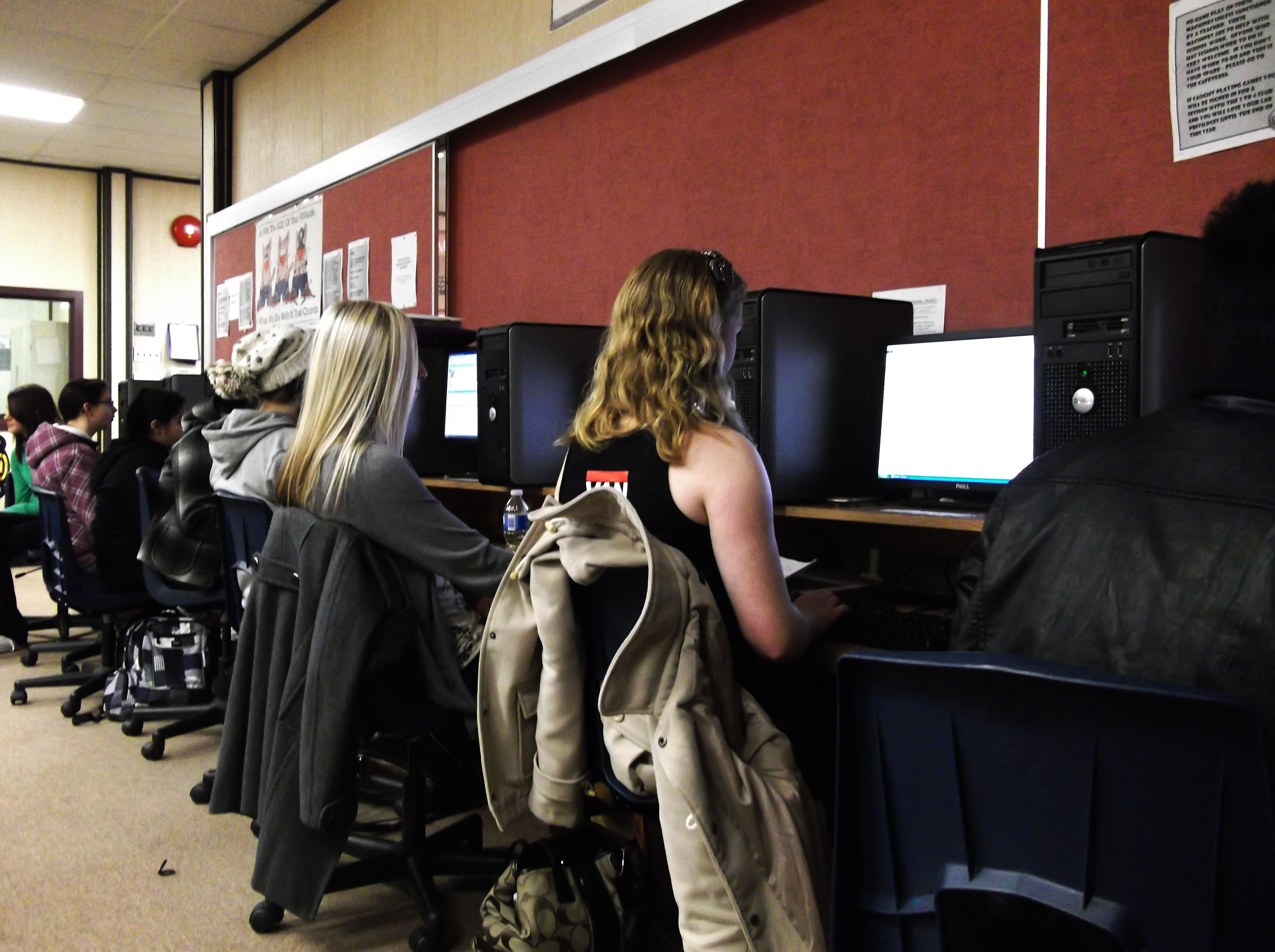E-Safety
Section outline
-
Online Resources for Yeovil College Staff, Parents and Students
Click the icons to find out more about:
 Staff E-Safety Resources
Staff E-Safety Resources Parents E-Safety Resources
Parents E-Safety Resources Students E-Safety Resources, including:
Students E-Safety Resources, including: How To...Social Networking (Safety Guides)
How To...Social Networking (Safety Guides) Internet Grooming and Stalkers
Internet Grooming and Stalkers How To Protect Your Hardware (for PCs, Tablets, Laptops and Mobile Phones)
How To Protect Your Hardware (for PCs, Tablets, Laptops and Mobile Phones) -
-
Extensive e-safety resources and information, provided by JISC Legal.
Specialist guides for a variety of ICT and ILT topics including student copyright guides, intellectual property and more.
-
Provided by the UK Safer Internet Centre, this helpline is for professionals who work with children in the UK. It is co-ordinated in partnership by: Childnet international, the South West Grid for Learning and the Internet Watch Foundation.It is co-funded by the European Commission.
-
The CEOP (Child Exploitation and Online Protection) Centre website.
-
Online resource providing comprehensive information and advice on a variety of e-safety topics.
-
Provided by the CEOP Centre, this website is aimed at children and young people, with age-appropriate advice, resources and activities, and also sections for teachers, parents and carers.
-
An organisation dedicated to promoting responsible online "digital citizenship", covering e-safety issues and providing resources for educators, parents, carers and young people.
-
How Internet filtering in educational contexts is best handled and integrated to general e-safety policy.
-
Excellent online guidance materials for any non-teaching staff working in FE - including what to look for regarding use of technology, social media and online activity.
-
How should teaching and professional staff working in education handle social media? Useful online guide dealing with frequently asked questions.
-
Comprehensive guide for schools and education providers about the use of social media for extremist purposes.
-
Social Networking PDF offering advice for teaching professionals who use social networks
-
From the Safer Internet Centre, this helpline provides support with all aspects of digital and online issues, offering signposting, advice and mediation.
-
This checklist is designed for teachers and professionals working in education to work through and assess how they would deal with different e-safety issues arising in their personal and professional lives.
-
This Digizen leaflet offers advice for staff who have experienced cyberbullying.
-
Short video clip from the former CEO of Childsnet, explaining why cyberbullying is such a vital issue to be tackled.There are also downloadable PDFs for teachers and educators about cyberbullying, and how to discuss the issue in a classroom environment.
-
Interactive webpage explaining both the benefits and risks to using social media and networks in education.
-
Online resource for teachers and lecturers on how to prepare and run pro-active sessions on e-safety. Links to further information.
-
Activities and resources from the ReadWriteThink website to use with learners.
-
Dealing with Online Discrimination and Cyberbullying
-
From Common Sense Media, this useful and comprehensive guide explains the key issues for teenagers of both genders, and how peer pressure and social media can affect them in differing ways.
-
This insightful factsheet from Cyberbullying.Org has detailed statistics and information about the instances of cyberbullying towards LGBTQI+ teens, and how to resolve the issue in schools and colleges.
-
From the Stop Online Abuse Website, this list of definitions and useful terms can aid understanding of online issues faced by the LGBTQI+ community online, and also how to deal with issues of misogyny and discrimination.
-
Detailed information from the Stop Online Abuse Website about dealing with homophobia and biphobia online - how to challenge derogatory content, why equality matters, case studies and other detailed information.
-
Moving article and thinkpiece about the tragic suicide of a young gay man after experiencing homophobic cyberbullying and image sharing.
-
Detailed information and resources from the Stop Online Abuse website, including how to challenge derogatory media, case studies, privacy for trans individuals and other useful information.
-
From Common Sense Media, these lesson plans and resources cover issues such as media gender roles, sexting, and online notoriety and fame.
-
JISC guides covering ICT and ILT accessibility for learners with SEN.
-
Combined report form the Anti-Bullying Alliance, Department of Education, Mencap, Childnet International et al.
-
An introductory article from the ParentInfo website about helping children and young people with learning disabilities and autism learn about internet safety.
-
Downloadable parent and carer's guide to internet safety, from the Cerebra charity website.
-
Comprehensive guide from Report-It.Org about internet hate crime of all descriptions, what the law says and how to deal with it.
-
This short guide is designed to help LGBTQA+ teenagers and young adults deal with online issues, such as targeted cyberbullying, online homophobia and transphobia.
You will find useful information, resources and links to websites and organisations.
-
E-Safety - Information for Parents
This section provides information and resources for staff and students who are parents or carers.
-
The CEOP's dedicated site for parents and carers who wish to make sure their children are taught how to use the Internet safely.
-
This Powerpoint file is designed by CEOP to inform parents about the organization and provides a comprehensive discussion of the main issues of e-safety.
-
Newly launched world leading Internet Safety organisation, designed to help parents safely naviagte the Internet with and for their kids. With resources and information regarding key issues, online activities and related to age group.
-
Provided by UK Safer Internet.org, this webpage provides advice, how-to guides and information about setting up parental controls, guides to various types of technology, and how to support children in staying safe online.
-
Useful guide to helping young people use smart phones safely and responsibly.
-
-
Official guidance from the Instagram website and advice centre for the popular photo-sharing app.
-
This CEOP guide explains the Kik messenger app and how parents and carers can encourage safe responsible use.
-
From the Internet Matter website, this clear how to guide explains how Snapchat works and how parents and carers can instruct teens how to use it safely.
-
Advice from the NSPCC on setting up controls, and facilitating safe online gaming.
-
This CEOP collaborative site for parents has a useful guide for helping children play Minecraft safely.
-
Video campaign produced by CEOP promoting e-safety and awareness for young people about major risks, particularly Internet grooming and social networking.
-
CEOP created and curated playlist explaining how to deal with issues arising from taking and sharing nude selfies.
-
Article from the Internet Matters website, discussing how parents can help their children manage their online reputations - and what they key issues are.
-
Vital information and links from the ParentInfo website about how to report and tackle unwanted content.
-
-
E-safety can cover a wide variety of issues and topics, sometimes more than you'd think!
Click here for our helpful glossary of terms - and what they mean.
-
Quick and light hearted guide to what you need to know about staying safe online.
-
-
-
Website with information, blogs and resources for anyone dealing with cyberbullying, sexting and digital abuse.
-
The main page on cyberbullying from the national bullying charity website. Contains, advice, links and also information about all types of bullying.
-
UK cyberbullying charity website, including a dedicated helpline, links and other useful information.
-
TedXTalk by Katherine Didier about the impact of cyberbullying and how she started a media campaign to promote awareness and tackle cyberbullying, based on her own personal experience.
-
Cybersmart's short film about a group of high school friends who post a rumour about a rival online - and set off a chain reaction. Dealing with cyberbullying, sexting and posting online videos and photos.
-
Award winning video from Childnet about cyberbullying.
-
Online video about cyberbullying, how it works and how to challenge it.
-
-
From the UK Safer Internet Centre, this simple table breaks down how an online reputation can be shaped.
-
Information booklet about sexting, its consequences and how to deal with the issue.
-
Article exploring online dating and meeting online friends.
-
From the Family Lives website, this brief guide advises on protecting your Twitter account from hacking.
-
An interactive game about social networking and online profile awareness.
-
Amusing short video about social networking.
-
A short video about malicious tagging online.
-
Stonewall's dedicated guide for LGBT young adults, covering key issues in staying safe online and dealing with homophobia and other issues.
-
How To... Social Network Settings
-
FAQ's, including privacy and safety guidelines, for the picture sharing app, Snapchat. To access, click on the "FAQ" link on the icon bar at the bottom of the page.
-
From the official Instagram blog, this page gives information regarding safety and security whilst using your Instagram account.
-
The official guidelines regarding privacy and security from the popular online community.
-
How to control your privacy and other guidelines for the music and audio sharing site, Soundcloud.
-
Privacy and sharing location settings on the free app, Foursquare.
-
-
The UK's national fraud reporting service and their guidelines about what to do in cases of identity theft.
-
Short video about an employer's view of your social profile.
-
From the Get Safe Online website, this selection of videos offers tips and guides on how to be safe online.
-
-
"Sexting"
-
Advice booklet on the risks of sexting, its consequences and how to deal with it.
-
If you receive an indecent image or message from someone, or are being harassed for sexual information or chat online, you can use this to ask for help.
-
MTV's dedicated website for cyberbullying, sexting and digital abuse provides information and points to consider for anyone thinking of sending a sext - and why they shouldn't.
-
Find out how you'd handle digital drama - from sexting to cyberbullying.
-
How to stay safe when using a webcam, and how to deal with being pressured into sexual behaviour.
-
Australian short video demonstrating why sexting is such a bad idea.
-
Technology expert and executive director Nyika Allen about her experiences with an ex-lover posting indecent images online, and how she now advocates for all victims of revenge porn.
-
-
Brief video clip explaining why logging off and shutting down are really good to do!
-
Comprehensive article from the PC World website about how to keep mobile data safe - for laptops, tablets and mobile phones.
-
Article covering bad adware (which can lead to viruses, malware and more), how to prevent it and how to remove it.
-
Short video by Google Privacy about using the Internet safely.
-
Article explaining the inbuilt security features of Google's Chrome browser, and how to make sure they're activated.
-
Article about your Firefox browser's security settings, and how to set them for ultimate protection.
-
Video explaining how phishing scams work, and how to avoid them.
-
Short video explaining the risks of downloading pirated software and media.
-
Short video about how to make safe, secure passwords.
-
E-Safety Tutorial Material
Every student must confirm they have had e-safety training by logging on to Moodle and providing feedback for each topic area.
-
Direct link to the CEOP UK police safety centre, which allows you to report your concerns or any instances of online abuse.
-
-
Video highlighting the risks of giving out personal information online.
-
-
-
-
Learn to turn off location tracking settings for photos taken on a SMART phone.
-
-
Short clip introducing young people to the repercussions of posting elements of their social lives online.
-
Learn how to mold your digital identity to a professional standard and impress prospective employers.
-
Give short feedback for the online "Creating a Positive Digital Identity" videos(s) you viewed.
-
-
-
-
-
Fake News and Misinformation Online (Tutor Discretion)
-
-
-
-

Figure 1: JISC Digital Wellbeing Model (Jisc, 2019)
-





















